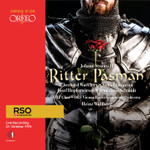|
Back
05/13/2021
Johann Strauss II: Ritter Pásmán, opus 441
Eberhard Waechter (Ritter Pásmán), Josef Hopferwieser (Karl Robert von Anjou), Sona Ghazarian (The Queen), Trudeliese Schmidt (Eva), Artur Korn (Rodomonte), Horst Witsche (Hofmarschall Omodé), Axelle Gall (Gundy), Peter Drahosch (Mischu), ORF Choir, Gottfried Preinfalk (chorus master), ORF Vienna Radio Symphony Orchestra, Heinz Wallberg (conductor) [* Complete ballet music: Slovak State Philharmonic Orchestra, Alfred Walter (conductor), a Marco Polo release]
Live recording: Musikverein, Vienna, Austria (October 27, 1975) and * House of Arts, Kosice, Slovakia (August 26-30, 1993) – 133’11
2 CDs Orfeo C200062 (Distributed by Naxos of America) – Booklet in German and English

   
Derived from János Aranyi’s comedy ballad, Pázmán lovag, the work was turned over to librettist Ludwig von Dóczy to fulfill the banal story. Testing the water, Johann Strauss II decided to venture out of his comfort world of operetta and make his one and only shot at comic opera with Ritter Pásmán. Despite a thin-lined narration revolving around jealously and revenge, the performance is strikingly fabulous.
Those with a bleachy Germanic vocabulary will lose some of the Straussian detail (there’s no libretto to follow along), but that’s not much of a loss since the score meanders and never achieves much emotional immediacy anyway. Ritter Pásmán’s musical heft seems to be lost, in part, because it’s through-composed, alongside Ludwig von Dóczy’s infirm plotline. As gorgeous as the music permits, nothing stands out with exception of a few pieces. Absent is the sparkly verve we find in Die Fledermaus or even Der Zigeunerbaron.
Loosely compared to Don Basilio buffo, Eberhard Waechter’s eponymous role is effusive and well developed. The warmth of his voice richly carries forward the absurd drama with a treasured spotlight held for him during the bittersweet aria, “Mir war so wohl” in Act II. Similarly, Josef Hopferwieser’s vibrantly light tenor voice as Karl Robert von Anjou infuses charm, adding brightness and ebullience to the opera. But the true pulsation in the vocal category goes to Trudeliese Schmidt whose pearly translucent mezzo voice cuts beautifully through some tricky note passages without any duress. Her crests are velvety and creamy.
Pinpointing a couple of poignant moments are as follows. While Act I essentially drifts about with a certain “nothingness”, Act II’s opening scène (Anjou and Eva) builds theatrically and musically...here’s where Johann Strauss II’s operatic lissome grandeur hangs on a momentous pedestal. Gleaming with serious sincerity, the music rises to the occasion. This duet (primarily sung in dialogue) segues into Mlle Schmidt’s aria, “O gold’ne Frucht”, turning closely to reminisces of Leo Fall’s breezy Madame Pompadour...Strauss has achieved a rare apex.
Much of the rhythm, characters and structure in Ritter Pásmán point directly to the insanity found within Nielsen’s Maskarade. To quote Shakespeare, “Much ado about nothing” is the motto for Ritter Pásmán.
Gottfried Preinfalk’s choir adds grand dimensions during several sections of the opera, particularly the luscious and majestic music Strauss wrote opening Act III. This leads into the ballet music...in this staging, only the "czárdás" is played. [The full 20 minute, three movement ballet is included, separately performed by the Slovak State Philharmonic Orchestra as a bonus extension.] Please don’t sigh...it’s a lovely divertissement although it’s completely incongruent and superfluous. That aside, we witness the Strauss beauty normally coming from his operettas...a rare treat. [It’s interesting to note the press on opening night, New Year’s Day in 1892, was more enchanted by the dance music than the opera itself!]
In the end, Ritter Pásmán has a good fill of music, though not permeating with memorability. To Orfeo’s credit, this 1975 recording is remarkably clear and luxuriant. Two things are going for this CD: it’s the only recording of Johann Strauss II’s lone opera along with his complete ballet music.
Fans will find this one-and-only operatic œuvre as a keepsake.
Christie Grimstad
|